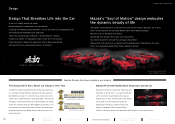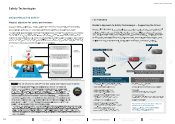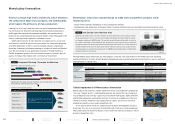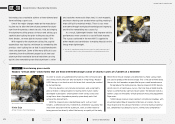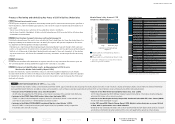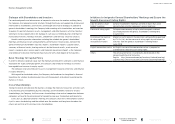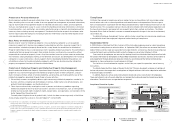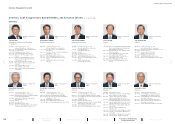Mazda 2016 Annual Report Download - page 31
Download and view the complete annual report
Please find page 31 of the 2016 Mazda annual report below. You can navigate through the pages in the report by either clicking on the pages listed below, or by using the keyword search tool below to find specific information within the annual report.
CHECK External Evaluations of CSR (As of June 1, 2016)
Mazda identifies key external ratings and evaluations both from within Japan and overseas. By analyzing the results, Mazda evaluates its own initiatives. Mazda continuously makes active efforts to disclose information
by responding to both domestic and global surveys and evaluations, such as those by socially responsible investment (SRI) and environment, social, and governance (ESG) rating organizations.
Mazda Group’s Key Areas of CSR
Initiatives (Materiality) (As of July 2016)
Influence on stakeholders*1
Extremely high
Category III Category I
High
Category IV Category II
High Extremely high
Significance of Mazda Group
impacts*2
Where significance of Mazda Group impact is
extremely high
Where significance of Mazda Group impact is high
*1 Expectation to Mazda Group and automotive industry
*2 Risk and opportunity for Mazda
Materiality items (As of July 2016)
Category
Items*
I
(Economic) Indirect Economic Impacts
(Environmental) Energy
(Environmental) Water Source in Community
(Environmental) Emissions
(Environmental) Effluents and Waste
(Environmental) Products and Services
(Labor practices) Occupational Health and Safety
(Labor practices) Diversity and Equal Opportunity
(Consumer issues) Customer Health and Safety
II
(Economic) Economic Performance
(Environmental) Transport
(Labor practices) Employment
(Labor practices) Training and Education
III
(Economic) Market Presence
(Environmental) Materials
(Environmental) Supplier Environmental Assessment
(Labor practices) Supplier Assessment for Labor Practices
(Social) Social Community
(Social) Supplier Assessment for Impacts on Society
(Consumer issues) Product and Service Labeling
(Consumer issues) Compliance of product area
IV
(Economic) Purchasing practices
(Environmental) Compliance of Environmental area
(Labor practices) Labor/Management Relations
(Labor practices) Equal Remuneration for Women and Men
(Human rights) Forced or Compulsory Labor
(Human rights) Assessment
(Social) Anti-corruption
(Social) Compliance of social area
(Consumer issues) Marketing Communications
(Consumer issues) Customer Privacy
* The item in each category is listed in G4 guidelines order.
• Inclusion in the FTSE4Good Index series since March 2011.
An SRI index developed by the FTSE Group, a fully-owned subsidiary of the London Stock Exchange.
• Inclusion in the STOXX Global ESG Leaders Index since September 2013.
STOXX is a global-index-development company located in Switzerland. Mazda is also selected in the
sub-index of social criteria in “STOXX Global ESG Social Leaders.”
• Inclusion in the Ethibel EXCELLENCE Investment Register since October 1, 2013.
Forum ETHIBEL is a Belgium-based non-profit organization that promotes socially responsible
investment (SRI) and CSR in Europe.
• Inclusion in the MSCI Global Sustainability Index since June 1, 2015.
An SRI index developed by MSCI (Morgan Stanley Capital International). The indexes include companies
with high ESG rating in their industry sectors.
• Inclusion in the Morningstar Socially Responsible Investment Index (MS-SRI) since January 2008.
The first SRI index developed in Japan.
• In the CDP Japan 500 Climate Change Report 2015, Mazda’s carbon disclosure score was 98 (out
of 100), with its performance score rated in Band B.
On behalf of 822 institutional investors with assets of US$95 trillion the CDP organization conducts research
and discloses information to better understand the risks and opportunities posed by climate change.
Process of Reviewing and Identifying Key Areas of CSR Initiatives (Materiality)
STEP 1 Extraction of social issues
Extract aspects of greatest importance from among the 46 specific standard disclosure aspects specified in
the G4 guidelines, from the following perspectives, and clarify the scope of expected impact (boundary) of
each aspect.
• Social issues in the business activities of the automotive industry and Mazda
• Social issues to which stakeholders attach particular importance or that have substantive influence when
stakeholders evaluate Mazda
STEP 2 Prioritization (Conduct interviews with external experts)
Evaluate the importance of the social issues extracted in Step 1, grade them and show the graded scores by
mapping according to the following two axes, to identify the aspects with greatest importance (the status
was reported to CSR Management Strategy Committee.)
• Horizontal axis: Significance of Mazda Group impacts (graded by Mazda’s relevant divisions, from such view-
points as the possibilities for existing risks and opportunities at Mazda, and the significance of their impact)
• Vertical axis: Influence on stakeholders (graded by external experts, from such viewpoints as the relation-
ship with the business activities of the automotive industry and Mazda, and of the possibilities for having
impact)
STEP 3 Validation
Reconfirm the validation of the boundaries of aspects identified in Step 2 based on the business plan, etc.
The CSR Management Strategy Committee approved the validation in July 2016.
STEP 4 Disclosure of identification results and development of PDCA cycle
(disclosed in
Mazda Sustainability Report 2016
)
Disclose the materiality aspects identified in Steps 1-3 and the management reporting results (Mazda
disclosed them for the first time in the
Mazda Sustainability Report 2016
). Continuously collect the opinions
of stakeholders inside and outside the Company and carry out periodic reviews to develop the PDCA (plan-
do-check-act) process.
Mazda CSR
MAZDA ANNUAL REPORT 2016
29 Foundations Underpinning
Sustainable Growth
Message from
Management
Review of Operations
Drivers of Value Creation
Financial Section
Contents


